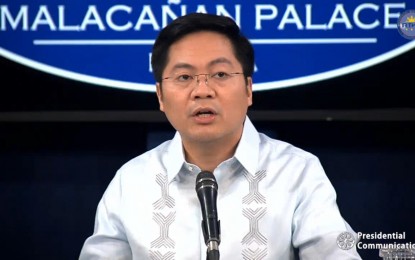
Cabinet Secretary Karlo Nograles. (File photo)
MANILA – Two days before the implementation of community quarantine in Metro Manila, the Inter-Agency Task Force for the Management of Emerging Infectious Disease (IATF-EID) met on Friday to finalize the planned travel ban exemption for people living outside the metropolis.
Cabinet Secretary Karlo Nograles said patients who acquired 2019 coronavirus disease (Covid-19), people aboard vehicles carrying cargoes, government officials, and workers residing outside Metro Manila may be allowed to go in and out of the area during the implementation of the community quarantine.
Nograles said the IATF-EID would also discuss the possibility of allowing members of the media from nearby provinces to enter Metro Manila.
He, however, said the proposed exemption would still have to be threshed out.
“Ipe-flesh out pa natin ang details kasi the general rule is by March 15, travel to and from Metro Manila ay tigil na. But maglalagay ng exemptions (We will flesh out the details because the general rule is by March 15, travel to and from Metro Manila is already suspended. But there will be exemptions),” Nograles told the “Laging Handa” press briefing.
President Rodrigo Duterte on Thursday ordered the implementation of community quarantine in the entire Metro Manila and suspended the domestic land, air, and sea travel to and from the area, amid the threat posed by Covid-19 in the country.
However, Duterte’s directives have sowed confusion among the public.
Nograles said the suspension of domestic travel in Metro Manila “will be reviewed on a daily basis and may be lifted earlier if the situation allows it or extended further if the situation requires it.”
Duterte has final say
Nograles also ensured that the IATF-EID would come up with a “clear” policy on travel restrictions.
He, however, said the proposed exemption would still have to secure Duterte’s approval.
The resolution that will be approved the inter-agency task force after the meeting would be presented to Duterte for his approval, Nograles noted.
“We will adjust accordingly kasi yung resolution namin (because our resolution) is merely recommendatory to the President. And the President will make the final decision doon sa mga resolution (on the resolution),” he said.
The IATF-EID has yet to release its updated resolution.
No need for EO
On Thursday, Duterte announced that he would issue an executive order (EO) to ensure the strict enforcement of his latest directives aimed at containing the spread of Covid-19.
But Nograles said there is no need to issue an EO because it would only cause delays in the implementation of preventive measures imposed in Metro Manila to fight the virus.
He said the possible changes would be contained in a memorandum, which is “already as good as law.”
“After he (Duterte) makes a final decision, then it will be embodied in a memorandum. Hindi na kailangan ng EO (There is no need for an EO). ’Yung adoption ng President (The President’s adoption) through a memorandum is enough to have the force and effect of law,” Nograles said.
Work in gov’t, private sector continues
Despite the implementation of community quarantine and travel ban in Metro Manila, Nograles said the government’s frontline services will continue.
Nograles said skeletal staffing patterns and telecommuting may be considered to ensure that public services remain “uninterrupted.”
In a memorandum circular released Wednesday, the Civil Service Commission encouraged all government offices to adopt “either or both” the four-day workweek and shifting work schedules.
Trade Secretary Ramon Lopez said the operations of private companies in Metro Manila would not be stopped.
Lopez said banks, offices, and factories would continue to operate during the imposition of community quarantine in Metro Manila.
Nograles said the private sector can also adopt flexible work schemes.
“For the private sector, we urge employers to adopt the (flexible) work arrangements that were outlined in a labor advisory that was issued by the Department of Labor and Employment,” he said. (PNA)
